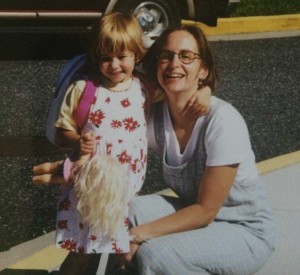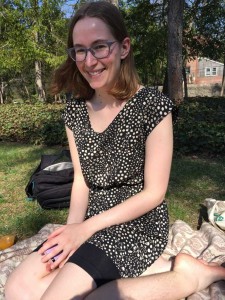Say Yes to the Dress: Femininity in Queer Spaces
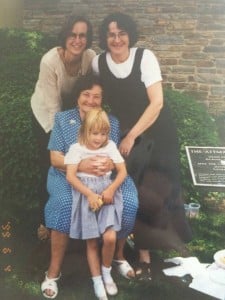
Photo: Family photo with my moms and grandma.
I grew up in pink tights and fluffy dresses. I loved dressing like a princess, performing living room dance routines with my cousins, and bossing my little brother around with a fairy wand. My moms made sure not to push me into stereotypical “girls” clothes, but they didn’t stop me from dressing all in pink when I told them that’s what I wanted. I was happy with what I wore and how I looked, and that’s all that mattered.
I shifted out of my princess stage sometime between kindergarten and middle school. I got rid of every pink thing I owned and refused to wear dresses for years. My parents were unconcerned by my choice in clothing, and I was proud to look different from other girls. My tomboyish look of boxy boy’s tie-dye t-shirts and sweatpants eventually evolved into the dykey wardrobe that had everyone assuming I was a lesbian before I was out to myself. The baggy flannel shirts, jeans, and Converse I wouldn’t take off throughout high school became a comfortable way for me to express my gender. Friends would gently tease me about my rotating set of hoodies and plaid, but I felt like my clothing helped me present myself the way I wanted to be seen: as a queer masculine woman.
I feel lucky to have grown up in a family who supported and loved me regardless of what I was wearing, and am glad I was able to experiment with my gender presentation as I grew up. However, once I fell into my more masculine presentation in high school, I found that further experimentation would come with intense scrutiny from people around me. Wearing a dress when I was in the mood triggered excessive and unwanted attention which made me choose the usual jeans and a T-shirt more than I wanted to. This attention came in part from infuriating catcalls from men. Perhaps even more painfully, it also came from friends and family who seemed entitled to ask why a queer woman like me would want to wear a dress.
As I became the target of these kinds of dismissive questions, I also began to notice the attitudes that dominated LGBTQ spaces I moved through. Often I was told that I didn’t belong in these spaces while wearing a dress, but at least I had the option to change my clothes and be welcomed again. Large, black, and/or feminine queer people are taken even less seriously and don’t have the option to change. During this time, I started to find presenting a certain kind of femininity empowering, and I wanted to be able to carry myself in a dress as confidently as I did when I was young. The reaction I got from other queer people stopped me, and the attitudes behind those reactions kept many people out of the LGBTQ spaces I once frequented. I slowly moved away from these toxic environments.
Packing to go to my Point Foundation interview in San Francisco during my senior year of high school was an emotional process. I knew that wearing a dress at my interview would help boost my confidence, but I was afraid I wouldn’t be taken as seriously as the masculine people in the room. I couldn’t stop thinking about all of the praise people had given me throughout my life about my intelligence and leadership skills while I was in pants, and how I had been mostly ignored while wearing dresses after a certain age. I put a striped button-down shirt and black slacks in my suitcase for the interview.
Harmful standards that value white, skinny, masculine bodies more than others exist at Pride events and within my college’s LGBTQ student groups. They’re advertised on TV and are reflected in the leadership of many LGBTQ organizations. We take these dominant messages with us when we go to Point events or interact with members of the Point community. After I had received the news that I had been selected as a Point Foundation Scholar, I was excited to attend a Point event that came with less pressure to impress than the interview. I was hopeful that I would find a space free from prejudices.
I brought a few dresses with me to Point’s summer National Leadership Conference and hoped people would treat me with the same respect they did when I was in slacks. At first, I didn’t notice any real differences in the way people acted around me. But as I attended more workshops and panel discussions, I began to notice a startling trend. Almost every person I heard speaking up, asking questions, and voicing opinions shared a certain kind of masculine presentation. No matter their gender identity, the people with short hair and bow ties dominated that space. The skinny white masculine people with just the right tight pants and brown leather shoes seemed to have the loudest voices. No one was outright telling certain people at the conference to stay quiet, but something about that environment seemed to make it challenging for feminine people to speak up. I didn’t raise my hand to share a thought once that weekend.
As I’ve said, this pattern is not at all unique to Point events. I see it play out in many LGBTQ spaces and my experience at my first Point conference was just one small example of how it can manifest. I hope we can work to make Point spaces truly celebratory of all bodies. I want to be able to wear a dress, raise my hand, and feel like everyone in the room will listen carefully to what I have to say. I want to be in a space where I can hear from those who are most marginalized in mainstream LGBTQ environments. We are leaders within our communities. I know we can be leaders in creating this kind of space for ourselves.
This post was written by Point Scholar Emily Ptak-Pressman
Emily happily grew up in a warm and loving queer activist family in Baltimore, Maryland and later Madison, Wisconsin, attending her first pride march in Washington, D.C. at the age of two. Emily is committed to fighting oppression of all kinds. Read more about Emily.
Related Posts
March 19, 2020, teampoint
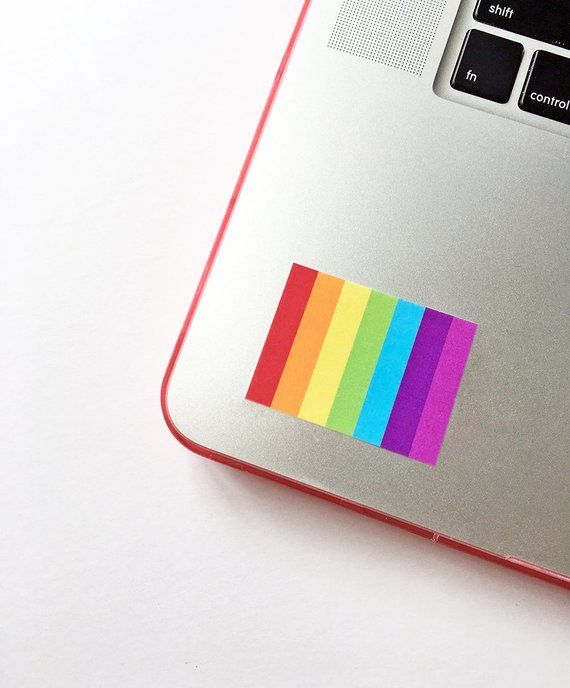
Should I come out in my application?
I was dressed in a navy suit with red corgi socks and a pink bow tie. I had looked at myself in the...
February 25, 2016, teampoint
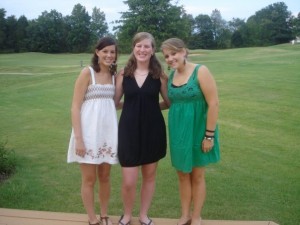
The Woman In A Tie: Embracing My Butch Identity
By Point Scholar Sarah Bacot It was near the end of the interview when the request came: “You know,...
January 23, 2018, teampoint

Learning Beyond the Classroom: Studying Abroad in Dominican Republic
In my Spring semester of 2018, I am very grateful to be studying abroad in Santiago de los...
